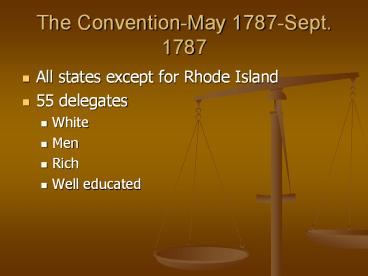The Convention-May 1787-Sept. 1787 PowerPoint PPT Presentation
Title: The Convention-May 1787-Sept. 1787
1
The Convention-May 1787-Sept. 1787
- All states except for Rhode Island
- 55 delegates
- White
- Men
- Rich
- Well educated
2
Famous attendees
- Washingtonelected president of convention
- Benjamin Franklin
- Alexander Hamilton
3
Virginia Plan (large state) Edmund Randolph
- Bicameralrepresentation in both houses based on
population3 year - Upper house elected by lower7 year terms
- Legislature chose executive and judiciary
- to legislate in all cases to which the
separate states are incompetent - Could veto state laws
- Did not include specific powers to tax or
regulate trade
4
- Executiveveto over legislation and serve 1
seven year term, not eligible for reelection - Judiciary to serve during good behavior
- Ratification by state conventions
5
New Jersey PlanEdmund Randolph
- Unicameral Congress
- power to levy import duties and a stamp tax. to
regulate trade, - use force to collect delinquent requisitions from
the states - Each state, one vote
- Legislature to elect a plural executive, to serve
one fixed term
6
- Executive to
- carry out laws,
- direct military operations
- appoint executive officers
- Executive to appoint federal judiciary
- Judges hold office during good behavior
7
Hamiltons Plan
- Hamilton suggested
- 3 branches
- Bicameral leg., with nearly exclusive sovereignty
with power to legislate on behalf of states - Assemble elected by people for 3 year terms
- Senate, chosen by electors from states, and
serve during good behavior
8
- Executive would be elected by electors and would
serve for life - Executive appoint state governorsthey would have
veto power over state legislation - Judges hold office during good behavior
- Debated for hours
- Never voted on
9
Great Compromise
- Great CompromiseRoger Sherman, CT
- Bicameral legislature
- House of Representation elected by the people on
the basis of proportional representation - Senate equal for all states. Each state
legislature would select 2 senators
10
- House have power to tax and spend
- Senate limited to accepting or rejecting these
bills (changed to allow Senate to amend tax bills
and - to develop appropriations bills
- Executive Elected by electors , each state have
- number equal to its of rep. and Senators
method of selecting electors left up to the
states - Each elector had to vote for 2 candidates, one
of whom had to be from another state
11
Judiciary separate branchserve for life
impeach if necessary to be decided by
leg. Madison opposed this viewed state equality
in Senate as a step away from a strong national
government Passed by a single vote Yes CT, NJ,
DE, MD and NC No PA, VA, SC, GA Divided MA
12
3/5s Compromise
- So. Slaves wanted all slaves counted/ No.
states wanted none counted - Compromise 3/5s would count for both
representation and direct taxes (taxes owed to
the Federal govt by the states) - There were be a periodic CENSUS
13
Congress given power to regulate foreign
trade South afraid this would allow Congress to
eliminate slavery Compromise was to give Congress
power to regulate trade, but Congress could not
interfere with slave trade for at least 20
years Good idea??????
14
Amending ProcessArticle 5 2 methods Supremacy
ClauseArticle 6 National laws trump state
laws No bill of rights some felt it would limit
peoples rights

